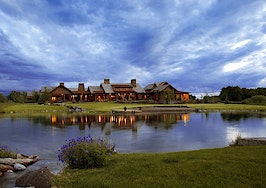Join the exceptional and become a Sotheby's International Realty agent.
Learn More
The first time I implemented a CRM solution for my luxury real estate practice, it was a humbling experience. I had always prided myself on a near-infinite memory—my colleagues were always impressed with my ability to recall my clients’ names and deals, even if years had passed since I had last served them.
Then I set up my CRM—and immediately, using only the initial data I put into the system, it identified several of my own clients who I had completely forgotten about.
It came as a shock, but it was a welcome surprise. In the luxury space, the majority of our business comes from our existing client base, and my business is no exception. I strive to keep my relationships with my clients alive, and my CRM has been instrumental in enabling me to do that.
Cloze is my CRM of choice, as it’s the platform Sotheby’s International Realty recommends to affiliates and has helped me achieve phenomenal results over the years. But regardless of which solution you’re assessing, here are five functions a high-performing CRM should include.
1. Look for a CRM with applicable artificial intelligence
A selling point for many CRMs is that they’re powered by AI—but be careful, because this can lead to needless complexity. Like household appliances, CRMs may come with countless bells and whistles that look impressive at first, but quickly prove impractical. You want a system that’s sophisticated, yet pragmatic and straightforward, recording and reporting only the information that will help you drive your business.
What does this look like in practice? In a word, centralization. Your CRM should connect the dots for all your people and properties, ensuring relevant correspondence and documentation are neatly categorized and easily accessible for each account. With records of everything—phone calls, text messages, email exchanges, and even social media references—you can monitor who you’ve contacted, what you discussed, and when you should be in touch with them next.
A CRM is also incredibly useful from a compliance standpoint. There are statutes that require us to keep up-to-date information for several years, and a best-in-class solution allows us to store it in a readily available yet unobtrusive way.
2. Your CRM should enable lead generation
The second feature of a great CRM is closely related to the first, because effective AI enables strong lead generation. I used to have dozens of client email accounts and phone numbers that were gathering dust—but as I noted earlier, Cloze’s robust algorithms began uncovering clients who had fallen through the cracks as soon as I set it up.
The results were pretty astonishing. I quickly resumed conversations with several dormant leads and closed deals for four of them, with three listings and one purchase—and that was within the first six months.
3. Opt for a CRM that provides data analytics
Your CRM should include an analytics platform that tracks activity in your system. Thanks to timely reports and insightful metrics, you can determine which initiatives make the biggest impact for your business, and which ones require a little more attention. From my perspective, having an analytics feature is a fantastic way to stay motivated.
A solution like Cloze lets you customize how your data is conveyed and displayed for maximum convenience. As a list-oriented person, I can format my leads and action items in a logical system that helps me measure my progress and hold myself accountable.
4. Find a CRM that offers email templates
A simple but life-changing CRM feature is the modular email template. There is a significant amount of repetition in real estate—for example, buyer disclosures and listing disclosures that are essentially the same for every client—and having a set message that can be revised and personalized for each sale takes what was once a tedious 20-minute task and reduces it to a matter of seconds.
5. Ensure your CRM offers integrations
When you adopt a CRM, opt for one that integrates seamlessly with your current technology stack. The whole point of these systems is to streamline and simplify your workflows, so it’s counterproductive if you still need to coordinate information across several different interfaces.
ActivePipe is a tool that Sotheby’s International Realty agents routinely use, and because it integrates with Cloze, I know that all my ActivePipe data is accurately reflected in my CRM without having to toggle between the two platforms.
No matter which software tools you prefer, make sure you’re selecting a CRM that’s compatible with it, as that helps you maintain a single source of truth for your data and clients.
Having a CRM has become a standard business practice in the luxury real estate space, but they’re not all created equal. Look for one that provides exceptional support for you, so you can continue providing exceptional support for your clients.

Glenn Norrgard
With his no-pressure style and nuanced negotiating skills, Glenn Norrgard has established a valued reputation for taking the stress out of real estate transactions. Buyers and sellers are drawn to his honest assessments and strategic approach, ensuring the best outcome for each individual’s needs. Glenn’s refreshing low-key demeanor has served him well through 25 years of New York City real estate sales. He has been a top 10 producer in his Sotheby’s International Realty office every year since joining the company in 1999 and consistently ranks in the top one percent of all 47,500 Realogy Brokerage Group sales associates nationwide. Glenn’s personal interests include theater, good books, dining out with friends, and skiing.








